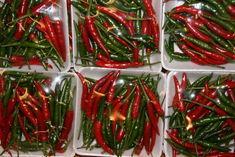
The Thai government has said it is conducting quality inspections on all shipments of 16 vegetables that face a possible ban from the EU to ensure there will be no exports of insect-contaminated fresh produce.
Kiat Sittheeamorn, president of the Thailand Trade Representative, proposed the measure last week to David Lipman, the EU Ambassador to Thailand.
The Thai government also proposed the EU send its officials to work with Thai agencies on quality control procedures. Thailand has inspected 50 per cent of its exported produce since September, more stringent than the normal 10 per cent sampling.
The EU Commission is scheduled to consider Thailand's proposal at the end of this month.
The 16 vegetables fall into five categories, including varieties of basil, chillies, peppers, eggplants, bitter gourds and parsley. The exports of these products to the EU have grown rapidly in recent years due to the rising popularity of Thai food.
Thailand said it would suspend exports of the 16 vegetables as of 1 February as a pre-emptive move to avoid a formal EU ban, which would take longer to lift.
EU food safety authorities said inspectors had found whiteflies, thrips and leaf miners on some of the vegetables and that a ban would be applied if nothing was done by 15 Jan., when food safety authorities will meet in Brussels.
Thailand does not want its vegetable exports to become an obstacle to its total exports worth 18 billion baht to the EU, or to the negotiations of a Thailand-EU free trade agreement, which awaits cabinet approval.
Lipman said the EU welcomed the chance to work with the Thai government: "The EU has not yet banned these vegetables, but we need them to arrive without pests.”
Chusak Chuenprayoth, vice-chairman of the Food and Agriculture Committee of the Thai Chamber of Commerce, said the chamber issued a letter to express its disagreement with a sudden temporary ban of vegetable exports to the EU that would start on 1 Feb.
He urged the government to guarantee exporters with no record of breaching food safety requirements they could export as usual. There are 70-80 vegetable exporters to the EU, with 50 exporting the five categories concerned. Around 10 of them have a pest problem.
The chamber also requested the government solve the problem of export smuggling and improve the quality control process at the airport as well as trace-back procedures from destinations to farms for officials of the agriculture department.
The Fresh Produce Consortium said: “We are liaising with Fera Plant Health which has advised that the Commission is awaiting a response from the Thai authorities to the report before making any decision on further action.”



